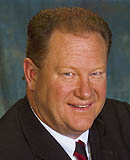


|
July 28, 2004
Front
Page
|
|
Q & A: Ed Schultz
Q. I want to get your thoughts on talk radio. It's almost 100% conservative. What can you offer differently to listeners? A. You have to understand the industry a little bit. One of the reasons why talk radio is conservative is because of Rush Limbaugh. He deserves a lot of the credit. It's basically evolved to where it is today because of the success of Limbaugh. If you're a business and you make a product and it's working, what are you gonna do? You're gonna make more of it. Limbaugh comes out with a three-hour show which set the table and really gave the birth of the industry of talk radio and revolutionized it. So now you got [radio station] program directors around the country in the late 80's saying 'Gosh that worked. We got anyone around here who can do that?' Conservative talk radio [begin ital] is [end ital] the industry. The reason there hasn't been a liberal is there hasn't been a need for one. They've [conservative talk shows] all been profitable. Conservatives have had a safe haven on talk radio for over 15 years, and they have had such a profound effect on the political landscape in this country that we're now at a point where the progressives, the Democrats, the Democratic party -- they're behind the eight ball. They gotta get into this game and if they don't, then they're gonna lose. Q. Bill O'Reilly [of Fox] flopped on radio. A. O'Reilly did. He's boring. If you want to have a great radio show, this is my philosophy: You gotta have pace. You gotta have personality, activity, communication, entertainment. You lose any one of those elements, you lose ratings, and you have to be compelling. You have to have a big sound. You gotta be aggressive. You gotta be provocative, and you gotta be edgy. Now I believe that despite my politics, I can be just as entertaining, I can be just as aggressive, communicate. If you wanna be a good communicator, you gotta listen. I don't screen my calls. My show is billed as "Where America comes to talk, The Ed Schultz Show." I believe that if you are in touch with the news, in touch with what's going on and you put these topics out in your monologue, callers respond to it. Right now what we have in the industry is manufactured radio. Limbaugh makes a big deal out of open-line Friday. Well, I have open lines every day, and I believe the host has gotta be good enough to drive the show. I'm news driven, based on what I think is important to people out there. Q. You call yourself "a gun-toting, meat-eating liberal." What do you mean by that? A. I think that when you hear the word "leftie" or "liberal," there is this cultural divide that is created in the mind [of] the American people that liberal is elitist, that liberal is out of the mainstream. But I don't believe that's true. I believe there's a lot of people out there in America who hunt, fish, eat meat, drink beer, and they're Democrats; they just don't have a voice. They care about the issues. The [radio] industry is delivering really just one ideology; and in the meantime they are talking down to us, telling us nothing else works except what they're doing. I don't believe that. I'm on a mission. I want to prove 'em wrong, I wanna have some fun doing it. I wanna see where this goes. I feel like I'm going to the plate in the bottom of the ninth with the bases loaded, and people wanna see if I can knock it out of the park. |
|
Q & A: R.Craig Sautter
Q & A: Al Franken
|
Media Nation
TM © 2004 University of Massachusetts Boston and
Nieman Foundation at Harvard University. Legal notice
